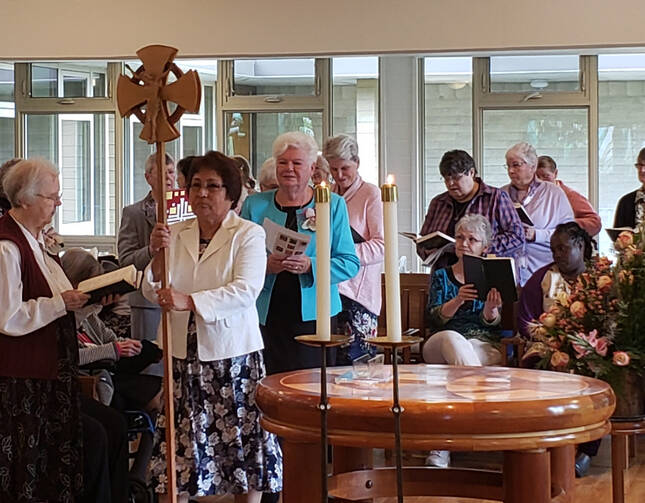On April 30, The New York Times reported on the deaths of five women from the coronavirus at a facility outside Milwaukee. The reporter Julie Bosman’s story was likely the first time many paused to consider the devastating impact of the coronavirus pandemic on a sometimes overlooked but highly influential subset of vulnerable elders: retired Catholic sisters.
Sisters Marie June Skender, Annelda Holtkamp and Bernadette Kelter, members of the School Sisters of St. Francis, were among the five women who tested positive for Covid-19 in post-mortem medical examinations. They were residents of Our Lady of the Angels Convent, which specializes in serving about 50 sisters from two congregations who benefit from memory care assistance.
While Covid-19 is an unexpected, recent phenomenon, the grief of loss is part of the larger experience of nearly every congregation of women religious today.
For those of us who knew and ministered with them as our sisters in religious life for more than half a century, their deaths are deeply personal. While Covid-19 is an unexpected, recent phenomenon, the grief of loss is part of the larger experience of nearly every congregation of women religious today.
We have an unwavering sense of responsibility to care for our many elderly sisters as a loving service, and we have maintained the highest standards of care in our retirement facilities. But as has been true for so many care facilities worldwide, that has not been enough to avoid the pandemic’s reach.
Each time a sister dies, we celebrate her life and remember with fondness all the good that she did. As we hear the words of remembrance shared at our sisters’ funerals, we are reminded of what remarkable lives they led. Sister Marie June was a teacher, musician and pastoral minister in the Midwest for more than six decades. Sister Annelda was a homemaker at our convents, including more than 30 years at our high school in Kenosha, Wis. Sister Bernadette spent the first half of her vocation teaching grade school, then served as a home health aide for three decades.
We take comfort in the knowledge that they are now enjoying the fullness of God’s love promised in the Gospel, but still we experience the very human feeling of loss. Rather than deny our pain, we seek to let it focus our awareness of the pain of others and fuel our mission, especially with those who are poor and marginalized.
The average age of sisters in the United States province of our order is 83, so much of our international congregation’s work in education, health care and social services is now being undertaken by our younger sisters ministering in the Southern Hemisphere. In Bhopal, India, for example, our sisters have gone door to door during the pandemic, checking on neighbors in the impoverished city to offer comfort to those who are locked down by government directives. The generosity of our supporters worldwide makes this extraordinary ministry of care possible.
The average age of sisters in the United States province of our order is 83.
To continue to undertake critical ministries like these in India, Africa, Latin America and here in the United States, we follow in the footsteps of our foundresses by continuously seeking innovative approaches to funding challenges.
Our Lady of the Angels is one such innovative initiative. The facility provides expert care in a setting specifically designed for elderly sisters with memory challenges. Its wide halls wind in such a way that a sister will always be led back to her own room. Sisters can participate in a wide range of daily activities that engage all their senses. The celebration of the Eucharist and praying of the rosary offer comforting spiritual sustenance to these women of deep faith.
What makes Our Lady of the Angels so unique is that it is the brainchild of not one but two congregations of women religious. Both our community and the School Sisters of Notre Dame recognized a shared need that could be met better together. We believe that seeking partnership and collaboration enables us to honor our past while preparing for the future and continuing our legacy of service to those in need.
Though the cost of providing this specialized care is always a challenge, we take comfort in knowing that at the end of their lives, Sisters Marie June, Annelda and Bernadette benefited from loving professional care, were accompanied by women they have loved for many years and found peace in a place they called home. Our Lady of the Angels represents our congregation’s commitment to meet our future needs with the bold spirit of our foundresses. We are continuously seeking new partners who share that vision for women’s religious life.
Our sisters around the world hold in prayer everyone who is making kindness and compassion their priorities to ease the burdens of this pandemic. We also ask for your prayers—for our sisters, for those with whom we minister and for those who are entrusted with the care of the most vulnerable.
Perhaps the experience of this pandemic will lead all of us to look again at how we deal with pain and loss. May it bring transformation, and a world where the needs of all are seen as the responsibility of all.










